Rachel McAdams Disobedience
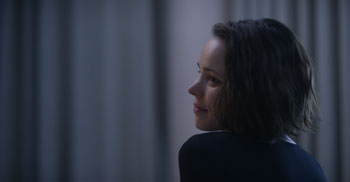
Set in an Orthodox Jewish Community
Cast: Rachel Weisz, Rachel McAdams, Alessandro Nivola
Director: Sebastián Lelio
Genre: Drama, Romance
Rated: MA15+
Running Time: 114 minutes
Synopsis: In a Jewish Orthodox Synagogue in Hendon, the frail Rav Krushka (Anton Lesser) collapses whilst giving a sermon. As funeral rites commence in London, the Rabbi's exiled daughter Ronit Khruska (Rachel Weisz) is living her life as a photographer in Manhattan. During a photo shoot she is told by the Brooklyn Synagogue of her father's death; wounded by the news and in a vulnerable state, she gets drunk in a local bar and sleeps with an undetermined man.
Ronit flies home to London where she feels out of place in the Orthodox Jewish community she left behind. She is greeted at the home of Dovid Kuperman (Alessandro Nivola), a son figure to the Rav, who is taken aback by the unexpected return of his childhood friend. Her welcome inside the home is hostile from those in the community gathering in the Rav's honour. Her aunt Fruma Hartog (Bernice Stegers) greets her more openly, though the air is frosty between Ronit and her uncle Moshe Hartog (Allan Corduner). Ronit is both upset and angry that she was not informed of her father's illness and that her father's obituary claims he was childless.
Despite tension surrounding Ronit's sudden departure in the past, Dovid invites her to stay with him and his wife. Ronit is shocked to discover that he is married to their former best friend Esti (Rachel McAdams), now a teacher at an Orthodox girls' school. It is uncomfortable between the two women; a complicated past is clearly hanging over them. The next day Ronit visits her father's grave. After further prayers at their home, Dovid, Esti and Ronit go to a dinner at the Hartog house with Rabbi Goldfarb (Nicholas Woodeson) and Rebbetzin Goldfarb (Liza Sadovy). Ronit tries to talk to her Uncle about selling her father's house, but he tells her now is not the right time for such a topic. Conversation turns to Ronit's successful career as a photographer and Rebbetzin questions why she goes by Ronnie Curtis after seeing one of her photos in a magazine. Esti, quietly joining in the conversation, states that women change their names all the time when they get married and lose their own history. Everyone is silently shocked at Esti's controversial comment.
Rebbetzin continues questioning Ronit's life in New York and asks why she is still not married, as it's the way it should be for a woman. Ronit disagrees, calling marriage an institutional obligation and if she had stayed in the community and been married off, she would have killed herself. Everyone is shocked by her outburst and Ronit, blaming her jet lag, excuses herself to go home. Dovid, upon Esti's request, leaves to walk her home. Ronit breaks down to Dovid, hoping her father knew she truly loved him. Dovid, struggling against the rules of his religion, tries to comfort his childhood friend without touching her.
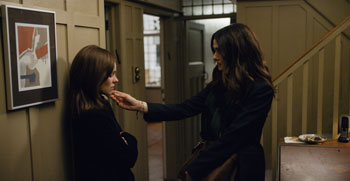 Ronit visits her uncle Hartog at his wigmaker's shop to continue the discussion of selling her father's house, but is informed by Hartog that the Rav left the house and all its contents to the Synagogue. She leaves and soon runs into Esti outside a supermarket. They visit the Rav's house together – a rundown mess full of medical equipment, it is not so much the house that Ronit wanted, but for her father to acknowledge her in his will. Esti admits that she does not want Ronit to leave again; past feelings are reignited and they kiss, at first timidly as Ronit pulls back, and then passionately. Ronit retreats once more, confused about her feelings.
Ronit visits her uncle Hartog at his wigmaker's shop to continue the discussion of selling her father's house, but is informed by Hartog that the Rav left the house and all its contents to the Synagogue. She leaves and soon runs into Esti outside a supermarket. They visit the Rav's house together – a rundown mess full of medical equipment, it is not so much the house that Ronit wanted, but for her father to acknowledge her in his will. Esti admits that she does not want Ronit to leave again; past feelings are reignited and they kiss, at first timidly as Ronit pulls back, and then passionately. Ronit retreats once more, confused about her feelings.
They leave the house and Esti confesses that she had called the Brooklyn Synagogue to let Ronit know of her father's death. She tells Ronit that she married Dovid, a man she doesn't love romantically but respects, as she was mentally unwell following Ronit's sudden departure and married their best friend upon the Rav's suggestion. As they relax into each other's company and kiss again, they are interrupted by Hinda (Clara Francis) and husband Lev (Mark Stobbart) and are unsure how much they saw. Esti rushes home, tense; she almost embraces Dovid but their marriage still lacks the passion she has with Ronit. At school, Esti is summoned to see the headmistress Mrs Shapiro (Caroline Gruber) where Hinda and Lev are waiting to confront her. Allegations about Esti and Ronit also plague Dovid when he is asked by the Synagogue to take on the Rav's work.
Ronit waits for Esti at the school gates, where Esti tells her about the formal complaint Hinda and Lev have submitted against her. Upon Ronit's suggestion, they escape the close knit community and head into central London for the day. Ronit and Esti continue to be conflicted in their attraction to one other; Esti feels guilty and is trying to lead a good life in line with her faith, but cannot help but desire her former lover. They go to a hotel where they make love, completely at ease and euphoric in each other's company. They talk about how Ronit's father first learnt of their relationship all those years ago.
Esti returns home late at night, where Dovid is waiting in their bedroom. He tries to get close to her but his yearning to be intimate with his wife is rebuked once again by a confused Esti. Nauseous the next day, Esti begins to wonder if she is pregnant. Dovid confronts Esti about Mrs Shapiro's accusations and she admits what happened between them. Dovid's anger almost turns violent as he releases his frustration at his wife's inability to embrace their life together. Ronit, having overheard the argument, tries to persuade Esti to leave her husband, but Esti struggles to come to a decision. They both try to convince each other, and themselves, they are happy in their lives.
Unable to cope with the current events, Dovid seeks refuge in a quiet Synagogue library. The atmosphere is tense when he returns home for dinner with Ronit and Esti. When Ronit announces that she has booked a flight back to New York that night, Dovid seems relieved and quietly asked his wife what she plans on doing now. Ronit and Esti share a difficult goodbye, both unable to share their true feelings. Esti accuses Ronit of taking the easy option by leaving, Ronit storms out the house and Esti slams the door behind her; both heartbroken at the recent events.
In the middle of the night, Esti leaves the house whilst Dovid is asleep and returns to the hotel room with a pregnancy test. Waking up at the airport the next morning, Ronit receives a panicked phone call from Dovid saying Esti is missing. After trying to calm him down, she continues to check into her flight, but later decides to leave and help Dovid in the search for her.
Returning home after failing in their search for Esti, Ronit is still angry that Dovid didn't tell her of her father's illness. Esti returns from hiding and, having heard everything, announces her pregnancy. Dovid is joyous, believing a child will solve all their marital problems, but Esti instead asks for freedom for her and her child. She was born into the community and wants to give her child the freedom of choice she never had. Dovid is speechless and Esti feels guilty for crushing her husband's dreams of becoming a father.
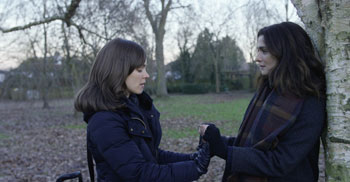 Ronit and Esti attend the Hesped at the Synagogue, intimidated by the judgemental looks they receive. Esti tries to make peace with Dovid, but he ignores her. Moved by the temple's sacred atmosphere, Ronit asks Esti to be with her in New York. They clutch hands as Dovid takes to the podium, where he struggles to deliver the official speech on the Rav's passing. Seeing Ronit in the crowd, he instead contemplates the notion of freedom and choice, a topic that the Rav spoke about in his final sermon, and grants Esti the autonomy she has requested. Dovid declines the Synagogue position and abruptly leaves the Hesped. Outside, overcome with emotion Esti and Dovid hug. Ronit watches on in the distance until Dovid extends an arm and the three friends have a long heartfelt hug together.
Ronit and Esti attend the Hesped at the Synagogue, intimidated by the judgemental looks they receive. Esti tries to make peace with Dovid, but he ignores her. Moved by the temple's sacred atmosphere, Ronit asks Esti to be with her in New York. They clutch hands as Dovid takes to the podium, where he struggles to deliver the official speech on the Rav's passing. Seeing Ronit in the crowd, he instead contemplates the notion of freedom and choice, a topic that the Rav spoke about in his final sermon, and grants Esti the autonomy she has requested. Dovid declines the Synagogue position and abruptly leaves the Hesped. Outside, overcome with emotion Esti and Dovid hug. Ronit watches on in the distance until Dovid extends an arm and the three friends have a long heartfelt hug together.
The next morning, Ronit prepares to leave for the airport. She bids a quiet farewell to Dovid outside his bedroom and goes to see Esti, who has slept on the sofa. They say goodbye; it seems Esti has decided against joining Ronit in New York. As Ronit's taxi pulls away down the street, Esti runs after her and the pair share a long goodbye kiss, promising to remain in contact. An emotional Ronit visits her father's grave one last time and takes a photo, achieving a sense of closure over his passing and the recent events.
Disobedience
Release Date: June 14th, 2018
Director: Sebastián Lelio
Genre: Drama, Romance
Rated: MA15+
Running Time: 114 minutes
Synopsis: In a Jewish Orthodox Synagogue in Hendon, the frail Rav Krushka (Anton Lesser) collapses whilst giving a sermon. As funeral rites commence in London, the Rabbi's exiled daughter Ronit Khruska (Rachel Weisz) is living her life as a photographer in Manhattan. During a photo shoot she is told by the Brooklyn Synagogue of her father's death; wounded by the news and in a vulnerable state, she gets drunk in a local bar and sleeps with an undetermined man.
Ronit flies home to London where she feels out of place in the Orthodox Jewish community she left behind. She is greeted at the home of Dovid Kuperman (Alessandro Nivola), a son figure to the Rav, who is taken aback by the unexpected return of his childhood friend. Her welcome inside the home is hostile from those in the community gathering in the Rav's honour. Her aunt Fruma Hartog (Bernice Stegers) greets her more openly, though the air is frosty between Ronit and her uncle Moshe Hartog (Allan Corduner). Ronit is both upset and angry that she was not informed of her father's illness and that her father's obituary claims he was childless.
Despite tension surrounding Ronit's sudden departure in the past, Dovid invites her to stay with him and his wife. Ronit is shocked to discover that he is married to their former best friend Esti (Rachel McAdams), now a teacher at an Orthodox girls' school. It is uncomfortable between the two women; a complicated past is clearly hanging over them. The next day Ronit visits her father's grave. After further prayers at their home, Dovid, Esti and Ronit go to a dinner at the Hartog house with Rabbi Goldfarb (Nicholas Woodeson) and Rebbetzin Goldfarb (Liza Sadovy). Ronit tries to talk to her Uncle about selling her father's house, but he tells her now is not the right time for such a topic. Conversation turns to Ronit's successful career as a photographer and Rebbetzin questions why she goes by Ronnie Curtis after seeing one of her photos in a magazine. Esti, quietly joining in the conversation, states that women change their names all the time when they get married and lose their own history. Everyone is silently shocked at Esti's controversial comment.
Rebbetzin continues questioning Ronit's life in New York and asks why she is still not married, as it's the way it should be for a woman. Ronit disagrees, calling marriage an institutional obligation and if she had stayed in the community and been married off, she would have killed herself. Everyone is shocked by her outburst and Ronit, blaming her jet lag, excuses herself to go home. Dovid, upon Esti's request, leaves to walk her home. Ronit breaks down to Dovid, hoping her father knew she truly loved him. Dovid, struggling against the rules of his religion, tries to comfort his childhood friend without touching her.
 Ronit visits her uncle Hartog at his wigmaker's shop to continue the discussion of selling her father's house, but is informed by Hartog that the Rav left the house and all its contents to the Synagogue. She leaves and soon runs into Esti outside a supermarket. They visit the Rav's house together – a rundown mess full of medical equipment, it is not so much the house that Ronit wanted, but for her father to acknowledge her in his will. Esti admits that she does not want Ronit to leave again; past feelings are reignited and they kiss, at first timidly as Ronit pulls back, and then passionately. Ronit retreats once more, confused about her feelings.
Ronit visits her uncle Hartog at his wigmaker's shop to continue the discussion of selling her father's house, but is informed by Hartog that the Rav left the house and all its contents to the Synagogue. She leaves and soon runs into Esti outside a supermarket. They visit the Rav's house together – a rundown mess full of medical equipment, it is not so much the house that Ronit wanted, but for her father to acknowledge her in his will. Esti admits that she does not want Ronit to leave again; past feelings are reignited and they kiss, at first timidly as Ronit pulls back, and then passionately. Ronit retreats once more, confused about her feelings. They leave the house and Esti confesses that she had called the Brooklyn Synagogue to let Ronit know of her father's death. She tells Ronit that she married Dovid, a man she doesn't love romantically but respects, as she was mentally unwell following Ronit's sudden departure and married their best friend upon the Rav's suggestion. As they relax into each other's company and kiss again, they are interrupted by Hinda (Clara Francis) and husband Lev (Mark Stobbart) and are unsure how much they saw. Esti rushes home, tense; she almost embraces Dovid but their marriage still lacks the passion she has with Ronit. At school, Esti is summoned to see the headmistress Mrs Shapiro (Caroline Gruber) where Hinda and Lev are waiting to confront her. Allegations about Esti and Ronit also plague Dovid when he is asked by the Synagogue to take on the Rav's work.
Ronit waits for Esti at the school gates, where Esti tells her about the formal complaint Hinda and Lev have submitted against her. Upon Ronit's suggestion, they escape the close knit community and head into central London for the day. Ronit and Esti continue to be conflicted in their attraction to one other; Esti feels guilty and is trying to lead a good life in line with her faith, but cannot help but desire her former lover. They go to a hotel where they make love, completely at ease and euphoric in each other's company. They talk about how Ronit's father first learnt of their relationship all those years ago.
Esti returns home late at night, where Dovid is waiting in their bedroom. He tries to get close to her but his yearning to be intimate with his wife is rebuked once again by a confused Esti. Nauseous the next day, Esti begins to wonder if she is pregnant. Dovid confronts Esti about Mrs Shapiro's accusations and she admits what happened between them. Dovid's anger almost turns violent as he releases his frustration at his wife's inability to embrace their life together. Ronit, having overheard the argument, tries to persuade Esti to leave her husband, but Esti struggles to come to a decision. They both try to convince each other, and themselves, they are happy in their lives.
Unable to cope with the current events, Dovid seeks refuge in a quiet Synagogue library. The atmosphere is tense when he returns home for dinner with Ronit and Esti. When Ronit announces that she has booked a flight back to New York that night, Dovid seems relieved and quietly asked his wife what she plans on doing now. Ronit and Esti share a difficult goodbye, both unable to share their true feelings. Esti accuses Ronit of taking the easy option by leaving, Ronit storms out the house and Esti slams the door behind her; both heartbroken at the recent events.
In the middle of the night, Esti leaves the house whilst Dovid is asleep and returns to the hotel room with a pregnancy test. Waking up at the airport the next morning, Ronit receives a panicked phone call from Dovid saying Esti is missing. After trying to calm him down, she continues to check into her flight, but later decides to leave and help Dovid in the search for her.
Returning home after failing in their search for Esti, Ronit is still angry that Dovid didn't tell her of her father's illness. Esti returns from hiding and, having heard everything, announces her pregnancy. Dovid is joyous, believing a child will solve all their marital problems, but Esti instead asks for freedom for her and her child. She was born into the community and wants to give her child the freedom of choice she never had. Dovid is speechless and Esti feels guilty for crushing her husband's dreams of becoming a father.
 Ronit and Esti attend the Hesped at the Synagogue, intimidated by the judgemental looks they receive. Esti tries to make peace with Dovid, but he ignores her. Moved by the temple's sacred atmosphere, Ronit asks Esti to be with her in New York. They clutch hands as Dovid takes to the podium, where he struggles to deliver the official speech on the Rav's passing. Seeing Ronit in the crowd, he instead contemplates the notion of freedom and choice, a topic that the Rav spoke about in his final sermon, and grants Esti the autonomy she has requested. Dovid declines the Synagogue position and abruptly leaves the Hesped. Outside, overcome with emotion Esti and Dovid hug. Ronit watches on in the distance until Dovid extends an arm and the three friends have a long heartfelt hug together.
Ronit and Esti attend the Hesped at the Synagogue, intimidated by the judgemental looks they receive. Esti tries to make peace with Dovid, but he ignores her. Moved by the temple's sacred atmosphere, Ronit asks Esti to be with her in New York. They clutch hands as Dovid takes to the podium, where he struggles to deliver the official speech on the Rav's passing. Seeing Ronit in the crowd, he instead contemplates the notion of freedom and choice, a topic that the Rav spoke about in his final sermon, and grants Esti the autonomy she has requested. Dovid declines the Synagogue position and abruptly leaves the Hesped. Outside, overcome with emotion Esti and Dovid hug. Ronit watches on in the distance until Dovid extends an arm and the three friends have a long heartfelt hug together. The next morning, Ronit prepares to leave for the airport. She bids a quiet farewell to Dovid outside his bedroom and goes to see Esti, who has slept on the sofa. They say goodbye; it seems Esti has decided against joining Ronit in New York. As Ronit's taxi pulls away down the street, Esti runs after her and the pair share a long goodbye kiss, promising to remain in contact. An emotional Ronit visits her father's grave one last time and takes a photo, achieving a sense of closure over his passing and the recent events.
Disobedience
Release Date: June 14th, 2018
Interview with Rachel McAdams
Question: What attracted you to the project when you first read the script?
Rachel McAdams: I fell in love with the script when I read it. It was beautifully written and unique, and the opportunity to work with Rachel Weisz was hard to turn down. I loved how sparse and yet complicated the story was. There were so many layers yet it was really respectful of the audience's intelligence and didn't force information on them. It's very rare to have a film with three leads where each has their own unique story arc from one another and together they make a really beautiful family.
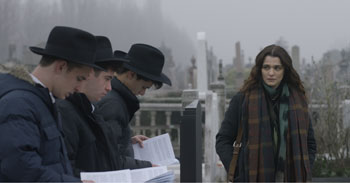 Question: Did you refer to the book whilst preparing for the role?
Question: Did you refer to the book whilst preparing for the role?
Rachel McAdams: Naomi Alderman wrote such rich people that I constantly found myself returning to the book and mining for poetic bits which could bring so much life to a scene. I actually hosted it with my book club around the time of Rosh Hashanah so it was my opportunity to go to all the Kosher supermarkets, it was a great education on being a good Jewish housewife!
Question: How did you research this role?
Rachel McAdams: Orthodox Judaism was a society which was so foreign to me to begin with and I've since come to admire and really respect it. I spent some time in the Los Angeles Orthodox Community going to Shabaz dinners and Kosher supermarkets; it's quite easy to go and people watch. But it was the help of some really extraordinary advisors who invited us into their homes for dinners and the generosity of the community that gave us such insight into what the world is really like. You feel the responsibility to portray things correctly, but I took some comfort in the fact that every Jewish Orthodox family follow the rules in their own style. Esti and Dovid are a fairly modern couple, there are some progressive elements to their relationship that don't belong to the Orthodox in the fact that they operate on a more equal level.
Question: Can you give us a bit of background on Esti and her relationship with her husband?
Rachel McAdams: Dovid and Esti have a loving relationship built on deep friendship and full of respect. When Ronit left so suddenly, Esti was destroyed and Dovid was there to pick her up, so she's very grateful to him for saving her life in some ways, but she might still be with him out of certain obligation and gratitude. She is living a life she thinks is good enough by ignoring her sexuality and making the choice to be with Dovid. Esti is a real believer in Judaism and being a good Jewish wife and member of the community, it's a belief that lives deep inside her. So to have her sexuality deemed not acceptable in her community creates an inner struggle for her. How can she still honour the life she loves and the people she loves? For the most part, she believes she is happy but doesn't realise she's cut off this major part of herself.
Question: What was it like to work with Alessandro Nivola?
Rachel McAdams: Alessandro was a great scene partner and has crafted a really beautiful Dovid; he always brings such humanity to his roles. It was really important to him that Dovid was a good guy who is struggling with his beliefs and the contradictions of this world and he really brought such truth to that struggle.
Question: What was it like to work with Rachel as both a producer of the film and an acting partner?
Rachel McAdams: Rachel has been such a champion for this film to get made and you can see the great love for the material in her performance. She wanted to find a story where there were strong parts for women. I'm grateful to her for that being a mission statement. On top of that she's an extraordinary actress who bought such compassion and confusion to Ronit. She expresses love so well by doing so little and can play free thinking rebellious women brilliantly and had a really beautiful interpretation of her character.
Question: What was it like working with Sebastián Lelio?
Rachel McAdams: Sebastián is wonderful; he is so meticulous when it comes to the details. He choreographed the scenes to the point that Rachel and I sometimes felt we were performing a dance. But he also knows how much can be said with a look and he would let the scene run organically as well. He was the best of both worlds; he could see when the director's touch needed to come in and when it was better to let it just fly. He's got that Latin rebellion in him that Ronit has that he could relate to and yet he's also got the quiet observant inner strength like Esti.
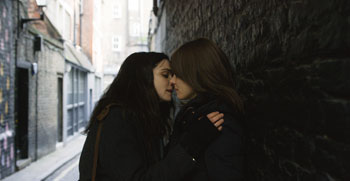 Question: What is it like for Esti when Ronit returns to the community?
Question: What is it like for Esti when Ronit returns to the community?
Rachel McAdams: It's difficult for Esti to have Ronit return and not be able to openly comfort her, she is very self conscious about how she acts and respectful of Dovid as they are the pillars of the community. She also feels the real sting that she left, not just her but Dovid as well. They were a great group of friends that only had each other and when Ronit left, it was a real betrayal to both of them. But somewhere deep inside, Esti knew that things needed to change, which is why she gets the message to Ronit that her father has passed; her return is the catalyst for Esti to revaluate her choices.
Question: What was it like to film the scenes where Esti can truly be herself with Ronit?
Rachel McAdams: The scenes in the hotel with Ronit were great to film because they were the only ones where Esti can truly let go. Sebastián expanded on the curiosity around what their life might have been outside the Orthodox community, by directing us to look at each other and wonder what could have been. So he's very in tune with the idea of regret and how damaging the intervention was that kept them apart.
Question: What do you hope audiences will take away from watching this film?
Rachel McAdams: The film explores the theme of personal freedom and what it means to follow your own path, so it is a story that has an incredible amount of hope in it. It's a great love story, but not just of one kind of love; love for god, love for friendship and romantic love. I have never seen a story that offers a glimpse into this world that goes this deep and looks into sexuality in this way. It's a story that needs to be told.
Rachel McAdams: I fell in love with the script when I read it. It was beautifully written and unique, and the opportunity to work with Rachel Weisz was hard to turn down. I loved how sparse and yet complicated the story was. There were so many layers yet it was really respectful of the audience's intelligence and didn't force information on them. It's very rare to have a film with three leads where each has their own unique story arc from one another and together they make a really beautiful family.
 Question: Did you refer to the book whilst preparing for the role?
Question: Did you refer to the book whilst preparing for the role? Rachel McAdams: Naomi Alderman wrote such rich people that I constantly found myself returning to the book and mining for poetic bits which could bring so much life to a scene. I actually hosted it with my book club around the time of Rosh Hashanah so it was my opportunity to go to all the Kosher supermarkets, it was a great education on being a good Jewish housewife!
Question: How did you research this role?
Rachel McAdams: Orthodox Judaism was a society which was so foreign to me to begin with and I've since come to admire and really respect it. I spent some time in the Los Angeles Orthodox Community going to Shabaz dinners and Kosher supermarkets; it's quite easy to go and people watch. But it was the help of some really extraordinary advisors who invited us into their homes for dinners and the generosity of the community that gave us such insight into what the world is really like. You feel the responsibility to portray things correctly, but I took some comfort in the fact that every Jewish Orthodox family follow the rules in their own style. Esti and Dovid are a fairly modern couple, there are some progressive elements to their relationship that don't belong to the Orthodox in the fact that they operate on a more equal level.
Question: Can you give us a bit of background on Esti and her relationship with her husband?
Rachel McAdams: Dovid and Esti have a loving relationship built on deep friendship and full of respect. When Ronit left so suddenly, Esti was destroyed and Dovid was there to pick her up, so she's very grateful to him for saving her life in some ways, but she might still be with him out of certain obligation and gratitude. She is living a life she thinks is good enough by ignoring her sexuality and making the choice to be with Dovid. Esti is a real believer in Judaism and being a good Jewish wife and member of the community, it's a belief that lives deep inside her. So to have her sexuality deemed not acceptable in her community creates an inner struggle for her. How can she still honour the life she loves and the people she loves? For the most part, she believes she is happy but doesn't realise she's cut off this major part of herself.
Question: What was it like to work with Alessandro Nivola?
Rachel McAdams: Alessandro was a great scene partner and has crafted a really beautiful Dovid; he always brings such humanity to his roles. It was really important to him that Dovid was a good guy who is struggling with his beliefs and the contradictions of this world and he really brought such truth to that struggle.
Question: What was it like to work with Rachel as both a producer of the film and an acting partner?
Rachel McAdams: Rachel has been such a champion for this film to get made and you can see the great love for the material in her performance. She wanted to find a story where there were strong parts for women. I'm grateful to her for that being a mission statement. On top of that she's an extraordinary actress who bought such compassion and confusion to Ronit. She expresses love so well by doing so little and can play free thinking rebellious women brilliantly and had a really beautiful interpretation of her character.
Question: What was it like working with Sebastián Lelio?
Rachel McAdams: Sebastián is wonderful; he is so meticulous when it comes to the details. He choreographed the scenes to the point that Rachel and I sometimes felt we were performing a dance. But he also knows how much can be said with a look and he would let the scene run organically as well. He was the best of both worlds; he could see when the director's touch needed to come in and when it was better to let it just fly. He's got that Latin rebellion in him that Ronit has that he could relate to and yet he's also got the quiet observant inner strength like Esti.
 Question: What is it like for Esti when Ronit returns to the community?
Question: What is it like for Esti when Ronit returns to the community? Rachel McAdams: It's difficult for Esti to have Ronit return and not be able to openly comfort her, she is very self conscious about how she acts and respectful of Dovid as they are the pillars of the community. She also feels the real sting that she left, not just her but Dovid as well. They were a great group of friends that only had each other and when Ronit left, it was a real betrayal to both of them. But somewhere deep inside, Esti knew that things needed to change, which is why she gets the message to Ronit that her father has passed; her return is the catalyst for Esti to revaluate her choices.
Question: What was it like to film the scenes where Esti can truly be herself with Ronit?
Rachel McAdams: The scenes in the hotel with Ronit were great to film because they were the only ones where Esti can truly let go. Sebastián expanded on the curiosity around what their life might have been outside the Orthodox community, by directing us to look at each other and wonder what could have been. So he's very in tune with the idea of regret and how damaging the intervention was that kept them apart.
Question: What do you hope audiences will take away from watching this film?
Rachel McAdams: The film explores the theme of personal freedom and what it means to follow your own path, so it is a story that has an incredible amount of hope in it. It's a great love story, but not just of one kind of love; love for god, love for friendship and romantic love. I have never seen a story that offers a glimpse into this world that goes this deep and looks into sexuality in this way. It's a story that needs to be told.
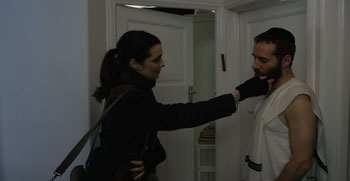 About The Production
About The Production
Rachel Weisz and Frida Torresblanco were searching for material to produce together, when Rachel mentioned Naomi Alderman's 2006 award-winning novel 'Disobedience'. Frida Torresblanco read the novel over a weekend and by Monday knew that this was the story the producing partners were looking for.
'We established this creative relationship from the beginning where we were really curious to find roles for women, women who are intelligent, determined and decision makers and not just there to support the male character.' Frida Torresblanco elaborates.
'What really grabbed me about the novel was the theme of transgression in the modern world where there is almost nothing taboo anymore. The term disobedience means very little unless you find the right community to set it in, like the small Orthodox Jewish community in North London. If you find a story of transgression within an ordered old fashioned society, I think you have a great universal drama that anyone can relate to.' Rachel Weisz continues.
Film4, who joined the production in its early development stages, with Rose Garnett and Daniel Battsek acting as Executive Producers, introduced the film to Ed Guiney; reuniting Rachel Weisz and Ed Guiney after their successful collaboration on Academy Award nominee The Lobster.
'What I really responded to most in the film was how utterly human these characters were with all their flaws and self-doubt; their forgiveness and their disobedience.' Ed Guiney explains as to what attracted him to the project.
Torresblanco, after seeing Sebastián Lelio's film Gloria, thought he would be the perfect director for the project and pitched the idea to him, as she explains:
'He has this extraordinary sensibility and he connects with women profoundly – he understands the mechanics of every detail of the performance. I pitched him the work and he was immediately very happy and enthusiastic. He read the book right away and had the same sensation of the uniqueness of this story as me and he came on board.'
He's an amazing filmmaker and he creates a wonderful atmosphere on set – there's intensity and a focus, but a great humanity and quite a lot of levity on his set' Ed Guiney continues After completing a few drafts of the script, Sebastian Lelio met with award-winning playwright, Rebecca Lenkiewicz to discuss continuing to work on the script together. Over the course of a year, they continued to research and write the script together, including spending a weekend in a Jewish hotel and a visit to the Orthodox community with author, Naomi Alderman, which Rebecca Lenkiewicz described as the 'most interesting forensic study of the script'.
'From the beginning, we were very simpatico about where it should go. Alderman's book is full of conflict and we knew we had to keep up the temperature of Ronit feeling compelled to come home. We all have a fear of family, as well as a love, and we wanted to honour the complexity of love and loss in her book'.
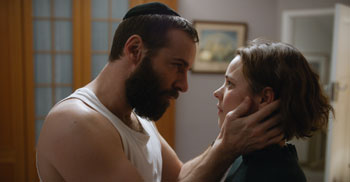 Disobedience also sees the reunion of Guiney and Director of Photography, Danny Cohen (Academy Award winner for The King's Speech) after their collaboration on Room, for which Ed Guiney received an Academy Award nomination for Best Motion Picture.
Disobedience also sees the reunion of Guiney and Director of Photography, Danny Cohen (Academy Award winner for The King's Speech) after their collaboration on Room, for which Ed Guiney received an Academy Award nomination for Best Motion Picture.
Ed Guiney expands on their second partnership and the ease to which Cohen can work with actors: 'Danny Cohen has great instincts in allowing the actors to inhabit the frame. They really trust that he's capturing them in the very best way and there's some amazing camerawork in the film.'
For Lelio, they formed a great team on set, as he explains: 'This film was a great adventure for me as I didn't know anyone and Danny became a great partner. He was always flexible and helpful in finding ways to beautifully capture the element of freedom for the actors'.
Disobedience, a drama of love and the fight for acceptance against the confines of the regimented Orthodox community in North London, has a universality that audiences will respond to as Lelio concludes: 'We're going through a war in which only certain relationships are considered legitimate and who draws the line where and with which authority. This is a story about characters that are willing to change and evolve, but to do so they have to go through very rigid structures and that confrontation resonates with what we're going through nowadays as a human society all over the world'.
'We established this creative relationship from the beginning where we were really curious to find roles for women, women who are intelligent, determined and decision makers and not just there to support the male character.' Frida Torresblanco elaborates.
'What really grabbed me about the novel was the theme of transgression in the modern world where there is almost nothing taboo anymore. The term disobedience means very little unless you find the right community to set it in, like the small Orthodox Jewish community in North London. If you find a story of transgression within an ordered old fashioned society, I think you have a great universal drama that anyone can relate to.' Rachel Weisz continues.
Film4, who joined the production in its early development stages, with Rose Garnett and Daniel Battsek acting as Executive Producers, introduced the film to Ed Guiney; reuniting Rachel Weisz and Ed Guiney after their successful collaboration on Academy Award nominee The Lobster.
'What I really responded to most in the film was how utterly human these characters were with all their flaws and self-doubt; their forgiveness and their disobedience.' Ed Guiney explains as to what attracted him to the project.
Torresblanco, after seeing Sebastián Lelio's film Gloria, thought he would be the perfect director for the project and pitched the idea to him, as she explains:
'He has this extraordinary sensibility and he connects with women profoundly – he understands the mechanics of every detail of the performance. I pitched him the work and he was immediately very happy and enthusiastic. He read the book right away and had the same sensation of the uniqueness of this story as me and he came on board.'
He's an amazing filmmaker and he creates a wonderful atmosphere on set – there's intensity and a focus, but a great humanity and quite a lot of levity on his set' Ed Guiney continues After completing a few drafts of the script, Sebastian Lelio met with award-winning playwright, Rebecca Lenkiewicz to discuss continuing to work on the script together. Over the course of a year, they continued to research and write the script together, including spending a weekend in a Jewish hotel and a visit to the Orthodox community with author, Naomi Alderman, which Rebecca Lenkiewicz described as the 'most interesting forensic study of the script'.
'From the beginning, we were very simpatico about where it should go. Alderman's book is full of conflict and we knew we had to keep up the temperature of Ronit feeling compelled to come home. We all have a fear of family, as well as a love, and we wanted to honour the complexity of love and loss in her book'.
 Disobedience also sees the reunion of Guiney and Director of Photography, Danny Cohen (Academy Award winner for The King's Speech) after their collaboration on Room, for which Ed Guiney received an Academy Award nomination for Best Motion Picture.
Disobedience also sees the reunion of Guiney and Director of Photography, Danny Cohen (Academy Award winner for The King's Speech) after their collaboration on Room, for which Ed Guiney received an Academy Award nomination for Best Motion Picture. Ed Guiney expands on their second partnership and the ease to which Cohen can work with actors: 'Danny Cohen has great instincts in allowing the actors to inhabit the frame. They really trust that he's capturing them in the very best way and there's some amazing camerawork in the film.'
For Lelio, they formed a great team on set, as he explains: 'This film was a great adventure for me as I didn't know anyone and Danny became a great partner. He was always flexible and helpful in finding ways to beautifully capture the element of freedom for the actors'.
Disobedience, a drama of love and the fight for acceptance against the confines of the regimented Orthodox community in North London, has a universality that audiences will respond to as Lelio concludes: 'We're going through a war in which only certain relationships are considered legitimate and who draws the line where and with which authority. This is a story about characters that are willing to change and evolve, but to do so they have to go through very rigid structures and that confrontation resonates with what we're going through nowadays as a human society all over the world'.
Disobedience
Release Date: June 14th, 2018
Have You Seen This?
MORE
- Mission: Impossible Fallout
- Glenn Close The Wife
- Allison Chhorn Stanley's Mouth Interview
- Benicio Del Toro Sicario: Day of the Soldado
- Dame Judi Dench Tea With The Dames
- Sandra Bullock Ocean's 8
- Chris Pratt Jurassic World: Fallen Kingdom
- Claudia Sangiorgi Dalimore and Michelle Grace...
- Rachel McAdams Disobedience Interview
- Sebastián Lelio and Alessandro Nivola...
- Perri Cummings Trench Interview







